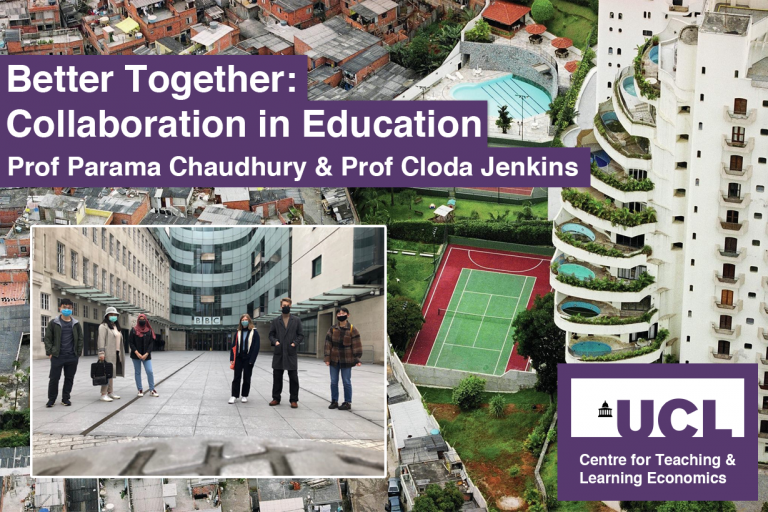60 seconds with... Professor Cloda Jenkins and Professor Parama Chaudhury
9 March 2021
Meet Professor Cloda Jenkins and Professor Parama Chaudhury from the UCL Department of Economics. They will be delivering their joint Inaugural Lecture, 'Better Together: Collaboration in Education', on 23 March 2021. Read on for a sneak preview...

Tell us a little about your research...
Cloda: My research falls between two stools: research on how to improve economics education and research on how to regulate markets. Both are largely about incentives, incomplete contracts and adapting approaches as the world around us moves at pace. My education research is focused on evaluating teaching and assessment approaches to find the ones that help students apply and use models and concepts to solve policy problems with evidence and to communicate their findings with others. I could just do this in my own modules, but I think it is important to share lessons learnt, on what works and what doesn't, through education research.
Parama: My current research focuses on identifying the sources of (and therefore policies to eradicate) gaps in academic outcomes for underrepresented minorities in economics. As a labour economist studying inequality and as Director of CTaLE and thus steeped in learning and assessment design, this topic is a natural choice for me. I’m also working on projects looking at student confidence and risk-taking and evaluating different elements of online education and their effects of different demographics. All my research is embedded in my practice as an educator and stems from my interests in policies addressing inequality in different parts of the economy.
Why is your research important?
C: Economics education, particularly at UCL, is excellent. Students are exposed to world leading rigorous research from early on. However, they often don't appreciate the value of what they are learning or how to use what they are learning until very late in their degree, if at all. We want to create a future pipeline of academic and professional economists that other people listen to and therefore need to ensure we find the best ways to combine the rigour with the application and the development of communication and group working skills.
P: In today’s world despite the strides we’ve made in reducing inequality of opportunity, significant gaps in academic outcomes at universities persist. Analysing the reasons for Is important particularly because of the doors that a good university degree can open. How we teach and what we teach can affect how students perform and so bringing my economist’s toolbox to analyse and then devise policies to address this knotty issue seems like a no-brainer!
What inspires you in your work?
C: Easy. The students - past, present, and future. I am very lucky to teach from 1st year through to MSc and every day, in class, in my inbox or in office hours, I learn something new, or see a different way of interpreting what I am saying, from a student.
P: The people around me, including colleagues, students, friends and family, are my main inspiration. As a social scientist, their experiences, opinions and suggestions are a core part of what I do and why I do it, and as such, I couldn't ask for a more rewarding job.
What has been your most memorable career moment so far?
C: The first time we hosted Explore Econ, our Undergraduate Conference (2015), I remember going home late in the evening beaming. It was phenomenal how students and colleagues responded. We had no idea what was involved with organising the event and it was mayhem on the day (behind the camera) but well worth the effort. The fact that it is now an established CTaLE annual event is something I am very proud of.
P: There are many of them, and they're pretty much all student-related, but if I had to pick one, it would probably be meeting the Bangladeshi parents of a student who until his 3rd year had been a II.1 student but graduated with a first as the first of his family to go to university. My father's family were from Bangladesh, and talking to them in Bengali and seeing their pride in their son, is something I will never forget.
What passions/hobbies do you have outside of work?
C: Sitting in a proper pub drinking a proper pint chatting with friends (proper pubs tend to be in Ireland ☘).
P: CRICKET, CRICKET, CRICKET!!! I do other stuff like pub quizzes (my teenage son is an avid quizzer, so I keep trying to join his team!), cooking, and travelling. But really it's all about the CRICKET!!!
What book is currently on your bedside table?
C: I have just finished Baking Cakes in Kigali by Gaile Parkin and am moving onto All Men Want to Know by Nina Bouraoui - my husband bought me a one year Daunt books subscription and I love when the new book comes through the post every month.
P: Richard Osman's The Thursday Murder Club - mysteries are my guilty pleasure, and the combination of a murder story and a quiz host is just heaven for me!
Catch up on the recording of Cloda and Parama's lecture
Inaugural Lecture Series 2020/21
This lecture is part of the 2020/21 series for UCL's Faculty of Arts & Humanities and Faculty of Social & Historical Sciences. The series provides an opportunity to recognise and celebrate the achievements of our professors who are undertaking research and scholarship of international significance, and offers an insight into the strength and vitality of the arts, humanities and social sciences at UCL.
All our lectures are free to attend and open to all. You don't have to be a UCL staff member or student to come along.
For information on previous and upcoming lectures please visit: https://www.ucl.ac.uk/social-historical-sciences/news-events/inaugural-lectures
 Close
Close

